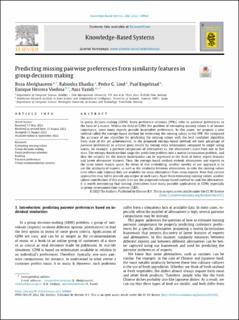| dc.contributor.author | Abolghasemi, Roza | |
| dc.contributor.author | Khadka, Rabindra | |
| dc.contributor.author | Lind, Pedro | |
| dc.contributor.author | Engelstad, Paal E. | |
| dc.contributor.author | Viedma, Enrique Herrera | |
| dc.contributor.author | Yazidi, Anis | |
| dc.date.accessioned | 2022-12-02T14:57:39Z | |
| dc.date.available | 2022-12-02T14:57:39Z | |
| dc.date.created | 2022-10-21T15:35:21Z | |
| dc.date.issued | 2022 | |
| dc.identifier.issn | 0950-7051 | |
| dc.identifier.issn | 1872-7409 | |
| dc.identifier.uri | https://hdl.handle.net/11250/3035703 | |
| dc.description.abstract | In group decision-making (GDM), fuzzy preference relations (FPRs) refer to pairwise preferences in the form of a matrix. Within the field of GDM, the problem of estimating missing values is of utmost importance, since many experts provide incomplete preferences. In this paper, we propose a new method called the entropy-based method for estimating the missing values in the FPR. We compared the accuracy of our algorithm for predicting the missing values with the best candidate algorithm from state of the art achievements. In the proposed entropy-based method, we took advantage of pairwise preferences to achieve good results by storing extra information compared to single rating scores, for example, a pairwise comparison of alternatives vs. the alternative’s score from one to five stars. The entropy-based method maps the prediction problem into a matrix factorization problem, and thus the solution for the matrix factorization can be expressed in the form of latent expert features and latent alternative features. Thus, the entropy-based method embeds alternatives and experts in the same latent feature space. By virtue of this embedding, another novelty of our approach is to use the similarity of experts, as well as the similarity between alternatives, to infer the missing values even when only minimal data are available for some alternatives from some experts. Note that current approaches may fail to provide any output in such cases. Apart from estimating missing values, another salient contribution of this paper is to use the proposed entropy-based method to rank the alternatives. It is worth mentioning that ranking alternatives have many possible applications in GDM, especially in group recommendation systems (GRS). | en_US |
| dc.description.sponsorship | This work was supported by the Andalusian Government through the project P20 00673 and by the project PID2019- 103880RB-I00 funded by MCIN/AEI / 10.13039/501100011033. | en_US |
| dc.language.iso | eng | en_US |
| dc.publisher | Elsevier | en_US |
| dc.relation.ispartofseries | Knowledge-Based Systems;Volume 256, 28 November 2022, 109860 | |
| dc.rights | Navngivelse 4.0 Internasjonal | * |
| dc.rights.uri | http://creativecommons.org/licenses/by/4.0/deed.no | * |
| dc.subject | Estimating missing values | en_US |
| dc.subject | Group decision-making | en_US |
| dc.subject | Fuzzy preference relations | en_US |
| dc.subject | Ranking | en_US |
| dc.subject | Pairwise preferences | en_US |
| dc.subject | Group recommendation systems | en_US |
| dc.title | Predicting missing pairwise preferences from similarity features in group decision making | en_US |
| dc.type | Peer reviewed | en_US |
| dc.type | Journal article | en_US |
| dc.description.version | publishedVersion | en_US |
| dc.rights.holder | © 2022 The Authors | en_US |
| dc.source.articlenumber | 109860 | en_US |
| cristin.ispublished | true | |
| cristin.fulltext | original | |
| cristin.qualitycode | 2 | |
| dc.identifier.doi | https://doi.org/10.1016/j.knosys.2022.109860 | |
| dc.identifier.cristin | 2063823 | |
| dc.source.journal | Knowledge-Based Systems | en_US |
| dc.source.volume | 256 | en_US |
| dc.source.issue | 256 | en_US |
| dc.source.pagenumber | 1-11 | en_US |
| dc.relation.project | Norsk Senter for Forskningsdata: 631862 | en_US |
| dc.relation.project | Junta de Andalucía: P20 00673 | en_US |
| dc.relation.project | Ministerio de Ciencia e Innovación/Agencia Estatal de Investigación: 10.13039/501100011033 | en_US |
| dc.relation.project | Junta de Andalucía: PID2019- 103880RB-I00 | en_US |

